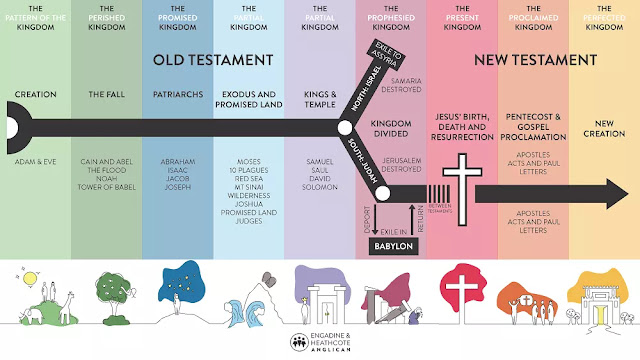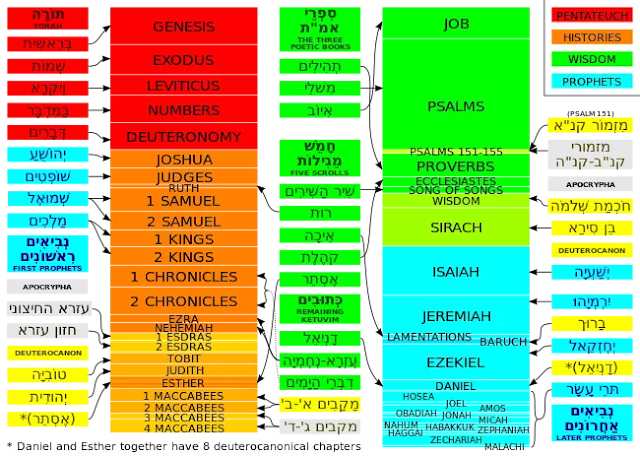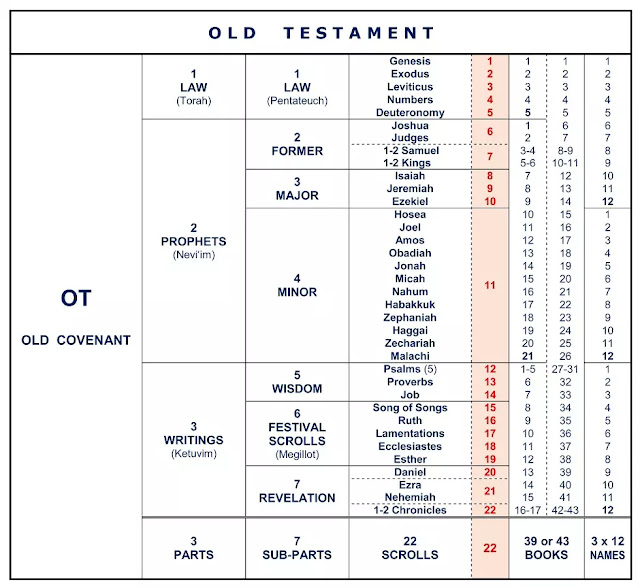The Bible is one of the most significant and influential texts in human history, with a profound impact on religion, culture, and society. For Christians, the Bible is the primary source of religious doctrine, providing guidance on matters of faith, morality, and spirituality. It is a collection of 66 books, written over a period of several thousand years, and containing a wide range of literary genres, including poetry, history, prophecy, and narrative.
 |
| Bible |
The question of "why 66 books in the Bible?" is
one that has intrigued scholars and believers for centuries. How were these
books chosen and why were others excluded? What criteria were used to determine
the Canon, and how has it evolved over time? These are complex and multifaceted
questions that require a deep understanding of the history and cultural context
of the Bible.
In order to understand the significance of the 66 books in
the Bible, it is essential to explore the history of this ancient text. By
doing so, we can gain a greater appreciation for the richness and complexity of
the Bible, and the ways in which it has shaped human history and culture.
Whether one is a devout Christian, a curious seeker, or a skeptic, there is
much to be gained from engaging with the history and significance of the Bible.
The History of the Bible
The Bible has a long and complex history, stretching back
thousands of years. It is divided into two main sections: the Old Testament and
the New Testament.
 |
| Bible History Timeline |
The Old Testament is a collection of 39 books, written
primarily in Hebrew, and covers the history of the Jewish people from the
creation of the world to the Babylonian exile. It includes books of law,
history, prophecy, and poetry, such as Genesis, Exodus, Psalms, and Isaiah.
The New Testament consists of 27 books, written primarily in
Greek, and focuses on the life and teachings of Jesus Christ, as well as the
early history of Christianity. It includes the four Gospels, Acts, the letters
of Paul and other early Christian leaders, and the Book of Revelation.
The development of the Canon, or the authoritative list of
books that comprise the Bible, was a long and complex process. In the early
years of Christianity, there were many different texts and writings circulating
among the various Christian communities. Some of these texts were considered
authoritative and were widely accepted, while others were deemed heretical or
unorthodox.
Over time, a process of canonization began to emerge, as
various Christian leaders and communities began to agree on a set of criteria
for determining which texts should be included in the Bible. These criteria
included factors such as apostolic authorship, orthodoxy, and widespread acceptance
among the Christian communities.
One of the most significant factors in the development of
the Canon was the role of the Councils, such as the Council of Hippo (393 AD)
and the Council of Carthage (397 AD), which affirmed the list of canonical
books that had been widely accepted by the Christian communities of the time.
These Councils played a crucial role in establishing the Canon of the Bible as
we know it today.
 |
| Bible Canon Chart |
In summary, the history of the Bible is a complex and
fascinating subject, encompassing the development of the Old and New
Testaments, the process of Canonization, and the role of the Councils in
determining the authoritative list of books that comprise the Bible.
Understanding this history is essential for gaining a deeper appreciation of the
significance of the 66 books in the Bible.
The Old Testament
The Old Testament, also known as the Hebrew Bible, is a
collection of religious texts that forms the first section of the Christian
Bible. It consists of 39 books written in Hebrew and Aramaic and was composed
over a period of approximately 1,000 years, from the 12th to the 2nd century
BCE.
 |
| The Old Testament |
Overview of the 39 books in the Old Testament
The 39 books in the Old Testament are divided into four
major sections: the Pentateuch, the Historical Books, the Poetical Books, and
the Prophets.
The Pentateuch, also known as the Torah, includes the first
five books: Genesis, Exodus, Leviticus, Numbers, and Deuteronomy. These books
detail the creation of the world, the history of the Jewish people, and the
laws and commandments that were given to them by God through Moses.
The Historical Books include Joshua, Judges, Ruth, 1 and 2
Samuel, 1 and 2 Kings, 1 and 2 Chronicles, Ezra, and Nehemiah. These books
provide a historical account of the Jewish people, including their conquest of
the land of Canaan, the establishment of the monarchy, and the Babylonian
exile.
The Poetical Books include Job, Psalms, Proverbs,
Ecclesiastes, and the Song of Solomon. These books contain poetry and wisdom
literature that offer insights into the human condition and the nature of God.
The Prophets include the Major Prophets (Isaiah, Jeremiah,
Lamentations, Ezekiel, and Daniel) and the Minor Prophets (Hosea, Joel, Amos,
Obadiah, Jonah, Micah, Nahum, Habakkuk, Zephaniah, Haggai, Zechariah, and
Malachi). These books contain prophetic messages that warn of impending
judgment and offer hope for the future.
The structure and organization of the Old Testament
The Old Testament is structured differently in different
Christian traditions, but most follow the order and grouping of books
established in the Septuagint, a Greek translation of the Hebrew Bible that was
widely used in the early Christian church. The books are organized according to
their literary genre and historical chronology, with the Pentateuch at the
beginning and the Prophets at the end.
The significance of the Old Testament for Christians
For Christians, the Old Testament is considered to be a
sacred text that provides a foundation for their faith. It contains the
prophetic messages that foretold the coming of Jesus Christ and the establishment
of the new covenant between God and humanity. The Old Testament also provides
important insights into the character and nature of God, as well as guidance
for ethical living.
The New Testament
The New Testament is the second part of the Christian Bible
and consists of 27 books. It tells the story of the life, teachings, death, and
resurrection of Jesus Christ, as well as the beginnings of the Christian
church.
Overview of the 27 books in the New Testament:
The Gospels (Matthew, Mark, Luke, John): These books are the
primary sources of information about the life and teachings of Jesus Christ.
Each Gospel has its own unique perspective and emphasis, and they are
collectively considered the heart of the New Testament.
Acts of the Apostles: This book chronicles the early history
of the Christian church, particularly the spread of the Gospel message through
the ministry of the apostles.
Epistles (Romans, 1 and 2 Corinthians, Galatians, Ephesians,
Philippians, Colossians, 1 and 2 Thessalonians, 1 and 2 Timothy, Titus,
Philemon, Hebrews, James, 1 and 2 Peter, 1, 2, and 3 John, Jude): These letters
were written by various early Christian leaders to provide guidance,
instruction, and encouragement to individuals and communities of believers.
They address a wide range of topics, including theology, ethics, and practical
matters of church organization and governance.
Revelation: This book is a highly symbolic account of a
vision received by the apostle John, which offers a message of hope and
encouragement to Christians in the face of persecution and suffering.
Structure and organization of the New Testament:
The New Testament is divided into four main sections: the
Gospels, the Acts of the Apostles, the Epistles, and the Book of Revelation.
The Gospels are placed at the beginning, followed by Acts, which serves as a
bridge between the Gospels and the Epistles. The Epistles are organized by
author, with Paul's letters coming first, followed by the letters of other
authors arranged roughly in order of length. The Book of Revelation, with its
highly symbolic imagery, is placed at the end of the New Testament.
Significance of the New Testament for Christians:
The New Testament is the foundation of Christian belief and
practice, providing the authoritative source of information about Jesus Christ,
the nature of God, and the principles of Christian living. It is through the
New Testament that Christians learn about the central message of the Gospel,
including the concepts of salvation, grace, and faith. The New Testament also
provides guidance on ethical and moral issues, and serves as a source of
inspiration and encouragement for believers.
Why 66 Books in the Bible?
The Bible as we know it today consists of 66 books, divided
into the Old Testament and the New Testament. The question of why there are
exactly 66 books in the Bible is one that has intrigued many scholars and
theologians over the years.
Historical and Theological Reasons behind the 66-book Canon
The history of the development of the Bible's Canon goes
back thousands of years. The Jewish Scriptures, which form the basis of the Old
Testament, were written over a period of several centuries, with the earliest
texts believed to have been written around 1200 BCE.
The Canon of the Old Testament was established by Jewish
scholars in the first century CE, and it consisted of 39 books, organized into
three categories: the Law (Torah), the Prophets (Nevi'im), and the Writings
(Ketuvim). The Canon of the New Testament, which consists of 27 books, was
established by early Christian leaders in the second and third centuries CE.
The criteria for inclusion in the Canon were based on
several factors, including the book's authorship, its theological content, its
consistency with other books in the Canon, and its acceptance by the religious
community. Many books that were widely circulated and read by early Christians
were not included in the Canon, as they did not meet these criteria.
The Significance of the Number 66 in the Bible
The number 66 is significant in the Bible, as it is the sum
of the numbers of books in the Old and New Testaments. Some scholars have
suggested that this was intentional, as a way of emphasizing the unity of the
Bible as a whole.
Others have pointed out that the number 66 has significance
in other cultures and religious traditions as well. In Chinese numerology, for
example, the number 66 is associated with good luck and fortune.
Alternative Canons and Their Reasons for Exclusion
There have been several alternative canons proposed over the
years, some of which include additional books that are not found in the Bible's
Canon. The most well-known of these is the Apocrypha, which consists of 15
books that are considered canonical by some Christian denominations, but not by
others.
The Apocrypha includes books such as Tobit, Judith, Wisdom
of Solomon, Sirach, Baruch, and Maccabees. These books were not included in the
Protestant Bible's Canon, but were included in the Catholic and Orthodox
Bibles.
The reasons for excluding these books from the Protestant
Canon are varied, but include concerns about their authorship, historical
accuracy, and theological content.
The Books of the Bible
The Bible is a diverse collection of texts that were written
over a period of several thousand years by different authors in various genres
and languages. Each book in the Bible has its own unique characteristics and
style, and understanding these can help us to appreciate their historical,
cultural, and theological significance.
The Old Testament
- Genesis - The book of Genesis is the first book in the Bible and sets the foundation for the rest of the Old Testament. It recounts the creation of the world, the fall of humanity, and the history of the patriarchs.
- Exodus - The book of Exodus tells the story of the Israelites' escape from slavery in Egypt and their journey to the Promised Land.
- Leviticus - The book of Leviticus contains laws and regulations for the Israelites to follow in order to maintain their covenant relationship with God.
- Numbers - The book of Numbers continues the story of the Israelites' journey to the Promised Land, including their rebellions against God and their victories over their enemies.
- Deuteronomy - The book of Deuteronomy contains a series of speeches by Moses to the Israelites, exhorting them to remain faithful to God and keep his commandments.
- Joshua - The book of Joshua recounts the conquest of Canaan by the Israelites under the leadership of Joshua.
- Judges - The book of Judges tells the story of Israel's cycle of sin, punishment, and redemption during the period of the judges.
- Ruth - The book of Ruth is a short story about a Moabite woman who becomes part of the Israelite community through her loyalty to her mother-in-law.
- 1 Samuel - The book of 1 Samuel tells the story of the prophet Samuel and the reigns of Saul and David as the first kings of Israel.
- 2 Samuel - The book of 2 Samuel continues the story of David's reign and his establishment of a united kingdom of Israel.
- 1 Kings - The book of 1 Kings recounts the reigns of Solomon and the subsequent division of the kingdom into Israel and Judah.
- 2 Kings - The book of 2 Kings continues the history of Israel and Judah, including the reigns of various kings and the eventual destruction of the kingdoms by the Babylonians.
- 1 Chronicles - The book of 1 Chronicles is a genealogical record of the Israelite people, tracing their ancestry from Adam to the exile in Babylon.
- 2 Chronicles - The book of 2 Chronicles continues the history of Israel from the reign of Solomon to the Babylonian exile, emphasizing the role of the temple and the worship of God in the life of the nation.
- Ezra - The book of Ezra tells the story of the restoration of the Israelites to their homeland after the exile in Babylon and the rebuilding of the temple.
- Nehemiah - The book of Nehemiah recounts the efforts of the governor Nehemiah to rebuild the walls of Jerusalem and restore the spiritual and social life of the people.
- Esther - The book of Esther is a dramatic story about a Jewish woman who becomes queen of Persia and saves her people from destruction.
- Job - The book of Job is a philosophical meditation on the problem of suffering and the nature of God's justice.
- Psalms - The book of Psalms is a collection of 150 hymns and prayers, expressing a range of emotions and experiences in the life of the faithful.
- Proverbs - The book of Proverbs contains wisdom sayings and practical advice for living a virtuous life.
- Ecclesiastes - The book of Ecclesiastes is a meditation on the vanity of human pursuits and the ultimate meaning of life.
- Song of Solomon - The Song of Solomon is a love poem between a man and a woman, often interpreted allegorically as a representation of the relationship between God and His people.
Controversies and Criticisms
Despite its importance to Christianity, the Bible has faced
various controversies and criticisms throughout history. Some of the main criticisms
include:
- Criticisms of the Bible's Canon and its exclusions - Critics have questioned the criteria used to determine which books were included in the Bible and which were excluded, as well as the exclusion of other texts that were considered sacred by some early Christian communities.
- The Apocrypha and its significance - The Apocrypha refers to a group of texts that were not included in the Hebrew Bible but were included in the Greek translation known as the Septuagint. While these texts were included in the Catholic and Orthodox Christian Bibles, they were excluded from the Protestant Bible. This has led to debates about the significance of these texts and their role in Christian theology.
- Debates about the authorship and authenticity of certain books - Some books of the Bible have been subject to debates about their authorship and authenticity, such as the authorship of the Pentateuch and the authenticity of certain letters attributed to Paul.
Conclusion
In conclusion, the Bible is a collection of 66 books divided
into two main sections, the Old and New Testaments. The history of the Bible is
complex and involves the development of the Canon and its criteria, as well as
the role of Councils in determining the Canon. The Old Testament consists of 39
books and the New Testament consists of 27 books, each with its own unique
structure, organization, historical context, and theological significance.
The Bible is significant to Christianity as it serves as the
primary source of religious authority and guidance for Christians. It provides
a foundation for Christian belief, teaches about God's relationship with
humanity, and offers moral and ethical guidance for believers.
There are controversies and criticisms surrounding the
Bible's Canon, including debates about the authorship and authenticity of
certain books, and the exclusion of alternative canons such as the Apocrypha.
Despite these debates, the Bible remains a central text for millions of people
around the world and continues to inspire and guide generations of believers.
In regards to the question of "why 66 books in the
Bible", it is clear that the number 66 is significant historically and
theologically. The development of the Canon and its criteria were influenced by
a variety of factors, including the need for consistency, theological
soundness, and a sense of tradition. Ultimately, the Canon serves as a
testament to the enduring faith and commitment of the Christian community
throughout history.








0 Comments